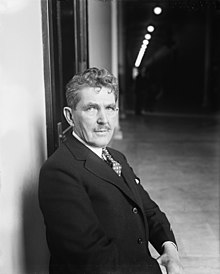Frederick Gilmer Bonfils
Frederick Gilmer Bonfils | |
|---|---|
 Bonfils in 1924 | |
| Born | December 21, 1860 Troy, Missouri, US |
| Died | February 2, 1933 (aged 72) Denver, Colorado, US |
| Resting place | Fairmount Cemetery |
| Occupation | Newspaper Publisher |
| Relatives | Helen Bonfils (daughter) May Bonfils Stanton (daughter) |
Frederick Gilmer Bonfils (December 21, 1860 – February 2, 1933) was an American businessman and publisher who, alongside Harry Heye Tammen, owned The Denver Post, the Kansas City Post, and the Sells Floto Circus.
Early life
[edit]Born in Troy, Missouri, he entered the United States Military Academy in 1878, but resigned in 1881 and went into land speculation in the Kansas, Oklahoma and Texas booms.[citation needed]

Career
[edit]Bonfils had met Harry Heye Tammen at the Windsor Hotel in Denver, where Tammen was a bartender, an editor of the Great-Divide Weekly Newspaper, as well as inauthentic Native-American memorabilia.[1] Together, in 1895, they bought The Denver Post.[1]
In December 1899, Tammen and Bonfils were shot in their office by W. W. Anderson, an attorney representing cannibal Alferd Packer, after they published an article that had accused Packer of cannabalism. In the scuffle, Bonfils was shot once in the neck, and Tammen once in the chest. Anderson was tried three times, but never convicted while Tammen and Bonfils were convicted for jury tampering in the third trial.[2]
Bonfils took $250,000 of bribes from Harry Ford Sinclair to not report on the Teapot Dome scandal. Bonfils and Tammen both justified their style of sensationalistic journalism, as well as crediting their success as newspapermen, with the quote "a dogfight on a Denver street is more important than a war in Europe."[3]
In 1902, Bonfils and Tammen bought the Sells Brothers Circus. Tammen rebranded the show to the Sells Floto Circus, after Otto Floto, the sportswriter of The Denver Post, who was involved in the publicity work for the show.[4] Bonfils and Tammen, known together as "Tam and Bon",[5] owned the show until 1921, when it was one of a number of shows acquired by the American Circus Corporation.[6]
In 1909, Bonfils and Tammen bought the Kansas City Post, and owned it until selling it to Walter S. Dickey in 1922, who then bought the Kansas City Journal and combined them into the Kansas City Journal-Post.[7] J. Ogden Armour was a silent partner in the endeavor. The Post with its tabloid format, red headlines and yellow journalism was closely tied to the rise of the Tom Pendergast political machine in Kansas City.[8]
Death
[edit]Bonfils died of encephalitis at his home in Denver, Colorado in 1933,[9] and was interred in the Fairmount Mausoleum at Fairmount Cemetery, Denver. At the time of his death, he was pursuing a libel lawsuit against the Post's competitor, the Rocky Mountain News.[10]
References
[edit]- ^ a b Leavitt, Craig; Noel, Thomas J. (February 15, 2016). Herndon Davis: Painting Colorado History, 1901–1962. University Press of Colorado. ISBN 978-1-60732-420-1.
- ^ American Council of Learned Societies (1943). Dictionary of American biography. University of Illinois Urbana-Champaign. New York, C. Scribner's Sons.
- ^ LIFE. Time Inc. March 29, 1954.
- ^ Johnston, Winifred (1935). "PASSING OF THE 'WILD WEST': A Chapter in the History of American Entertainment". Southwest Review. 21 (1): 33–51. ISSN 0038-4712. JSTOR 43462218.
- ^ Bricklin, Julia (September 1, 2018). Polly Pry: The Woman Who Wrote the West. Rowman & Littlefield. ISBN 978-1-4930-3440-6.
- ^ "Bailey and the Ringlings". June 11, 2008. Archived from the original on June 11, 2008. Retrieved December 26, 2023.
- ^ Ford, Susan Jezak (2003). "Biography of Walter S. Dickey (1862-1931), Newspaper Owner".
- ^ "The Kansas City Journal-Post Digital Access Project". December 12, 2007. Archived from the original on December 12, 2007. Retrieved December 26, 2023.
- ^ Staff report (February 3, 1933). F. G. BONFILS DEAD; VETERAN EDITOR; Built The Denver Post Into One of the Largest Newspapers in the Nation. HAD SPECTACULAR CAREER I Long a Circus Owner. Took Part in Rush Into Indian Territory. Important Teapot Dome Witness. New York Times
- ^ "Death in Denver - TIME". July 25, 2008. Archived from the original on July 25, 2008. Retrieved May 1, 2023.
